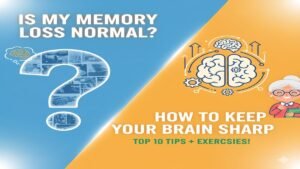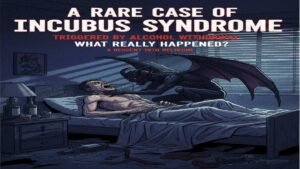Depression can quietly take over your thoughts, energy, and daily life. Whether you’re just starting to understand what you’re feeling or you’ve been silently struggling for a while, this beginner’s guide offers expert-approved, practical steps to help you regain control—one small action at a time.
Table of Contents
ToggleWhat Is Depression?
Depression is more than just feeling sad or going through a rough patch—it’s a serious mental health condition that affects how a person thinks, feels, and functions in daily life. Clinically known as major depressive disorder (MDD), depression can cause persistent feelings of hopelessness, emptiness, or a lack of interest in once-enjoyable activities. It can disrupt sleep, appetite, energy levels, concentration, and even relationships. Unlike occasional mood swings, depression doesn’t just “go away” with time. It often requires professional support, therapy, or medication. Recognizing the symptoms early and seeking help can make a significant difference in recovery. You’re not alone—and help is available.
Definition and Common Misconceptions
Interdependence in relationships refers to a healthy balance where both partners maintain their individuality while supporting each other emotionally, mentally, and practically. Unlike codependency—where one partner may lose their sense of self—interdependence thrives on mutual respect, trust, and personal growth. A common misconception is that being interdependent means being overly dependent or emotionally needy. In truth, it’s quite the opposite. Interdependence encourages open communication, shared goals, and space for both partners to flourish as individuals and as a couple. Recognizing this difference is key to building strong, lasting, and emotionally fulfilling connections.
How It Differs from Sadness or Burnout
While sadness and burnout share some surface-level symptoms with depression, they are not the same. Sadness is a natural emotional response to life events—like losing a loved one or facing disappointment—and it usually fades with time. Depression, however, lingers for weeks or even months and affects nearly every part of daily life, including sleep, appetite, motivation, and self-worth.
Burnout, on the other hand, is typically tied to chronic work-related stress. You may feel exhausted, detached from your job, or unable to meet demands. But unlike depression, burnout is often relieved with rest or lifestyle changes. Depression doesn’t just go away with a weekend off or a vacation; it’s a complex mental health condition that may require therapy, medication, or both.
Recognizing the difference is crucial. While sadness and burnout can be temporary, depression is persistent and can worsen without proper treatment. If you’re unsure, it’s always best to talk to a mental health professional for a clear diagnosis and support.
Signs and Symptoms of Depression
Depression affects more than just your mood — it can influence every aspect of your life, from how you think and feel to how you act and interact with others. Recognizing the early signs can make a significant difference in seeking timely support and treatment. Here’s a breakdown of the most common symptoms:
Emotional Symptoms
Emotional changes are often the first noticeable signs of depression. These feelings can linger for weeks or months and may interfere with daily functioning:
- Persistent sadness or emptiness – A heavy, constant low mood with no obvious reason.
- Loss of interest or pleasure – Hobbies, relationships, and activities you once enjoyed may feel meaningless.
- Feelings of hopelessness or helplessness – You may feel like nothing will get better, and there’s nothing you can do to improve your situation.
- Excessive guilt or worthlessness – Harsh self-criticism or a sense of being a burden to others is common.
- Irritability or frustration – Small problems may trigger strong emotional reactions.
- Difficulty concentrating – Trouble focusing, remembering details, or making decisions.
Physical and Behavioral Symptoms
Depression doesn’t just live in your head — it often manifests in physical and behavioral changes too:
- Fatigue or low energy – Even small tasks may feel exhausting or take extra effort.
- Changes in appetite or weight – You may eat too much or too little, often without realizing it.
- Sleep disturbances – Difficulty falling asleep, waking up too early, or sleeping excessively.
- Slowed movements or speech – Noticeable changes in physical activity or speech pace.
- Neglecting responsibilities – Work, studies, or personal hygiene may be ignored.
- Withdrawal from social connections – You might avoid friends, family, or social events.
- Unexplained aches and pains – Headaches, back pain, or digestive issues without a clear cause.
When to Seek Help
If you or someone you love is experiencing these symptoms for more than two weeks, it’s important to seek professional help. Depression is not a sign of weakness — it’s a real medical condition that can be treated. Reach out to a mental health professional, talk to your primary care doctor, or call a helpline in your area.
What Causes Depression?
Depression is not caused by a single factor—it’s often the result of a complex mix of biological, psychological, and environmental influences. Understanding these root causes is the first step toward healing and finding the right treatment.
Biological Factors
Biological causes of depression include genetic predisposition, chemical imbalances in the brain (especially neurotransmitters like serotonin, dopamine, and norepinephrine), and changes in brain structure or function. People with a family history of depression are more likely to experience it themselves. Additionally, hormonal shifts—such as those during pregnancy, postpartum, or menopause—can also trigger depressive symptoms. Certain medical conditions like chronic pain, thyroid issues, or neurological disorders may further increase vulnerability.
Psychological Triggers
Psychological factors often stem from early life experiences, unresolved trauma, or patterns of negative thinking. People who have low self-esteem, are overly self-critical, or who struggle to cope with stress may be more susceptible to depression. Long-term exposure to emotional neglect, abuse, or significant loss can also leave lasting emotional wounds that manifest as depression over time.
Environmental and Lifestyle Influences
Our surroundings and daily habits play a crucial role in mental health. Persistent stress from work, relationship problems, financial pressure, or lack of social support can all contribute to depression. Lifestyle factors—like poor sleep, lack of exercise, substance abuse, or an unbalanced diet—can further disrupt mental well-being. Even reduced exposure to sunlight, as seen in seasonal affective disorder (SAD), can significantly affect mood.
How to Cope with Depression (Beginner’s Toolkit)
Depression can feel overwhelming, but you don’t have to face it alone or unprepared. This beginner-friendly guide offers simple, evidence-based steps to help you take back control, one day at a time. Whether you’re newly diagnosed or just starting to recognize the signs, this toolkit can support your journey toward healing.
Start with Daily Routines (Sleep, Nutrition, Exercise)
Creating structure in your day is one of the most underrated tools for managing depression. Start with small, manageable goals:
- Sleep: Aim for 7–9 hours each night. Try going to bed and waking up at the same time every day—even on weekends.
- Nutrition: Fuel your body with balanced meals. Focus on whole foods like vegetables, fruits, whole grains, lean proteins, and healthy fats.
- Exercise: You don’t need to run marathons. Even a 20-minute walk daily can boost mood by increasing endorphins and reducing stress.
Consistency helps regulate your body’s internal clock and improves energy, mood, and motivation over time.
Talk Therapy and Counseling
Speaking with a mental health professional can be life-changing. Therapies like Cognitive Behavioral Therapy (CBT) or Interpersonal Therapy (IPT) are effective in treating depression by helping you reframe negative thoughts and improve coping strategies.
Don’t wait for things to get worse—therapy isn’t just for crisis moments. It’s a safe space to explore emotions, patterns, and life challenges with expert guidance.
Medication: What You Should Know
For some, medication plays a crucial role in managing depression. Antidepressants, such as SSRIs or SNRIs, help rebalance brain chemistry to reduce symptoms.
What to remember:
- Medication isn’t a “happy pill,” but it can make daily functioning easier.
- Effects may take a few weeks to show.
- Always consult a psychiatrist or doctor before starting or stopping any medication.
Finding the right medication may involve some trial and error—be patient, and stay in close contact with your provider.
Mindfulness, Meditation, and Breathing Exercises
Mindfulness practices teach you to stay present without judgment. This helps you break the cycle of overthinking and emotional overwhelm.
- Try this: Close your eyes and take five slow, deep breaths. Focus only on the sensation of your breath. If your mind wanders, gently bring it back.
- Apps like Headspace or Insight Timer offer guided meditations perfect for beginners.
- Practice daily, even for just 5–10 minutes.
These exercises lower cortisol (stress hormone), improve emotional regulation, and bring a sense of calm to chaotic thoughts.
Building a Support SystemConnection is a powerful antidote to depression. While isolation may feel safe, reaching out can truly shift your mental state.
Talk to someone you trust—a friend, family member, or mentor.
- Join a support group, online or in person, where others understand what you’re going through.
- Set boundaries to protect your energy, but don’t shut people out completely.
You don’t have to have all the answers. Just being heard can make a big difference.
When and How to Seek Professional Help
Finding the Right Mental Health Professional
Choosing the right mental health professional is a crucial first step toward healing. Depending on your needs, you might seek a psychologist, psychiatrist, counselor, or therapist. Each specializes in different aspects of mental well-being—psychologists often focus on talk therapy, while psychiatrists can prescribe medication.
Look for licensed professionals with experience treating your specific concerns—such as depression, anxiety, trauma, or relationship issues. Don’t hesitate to ask about their approach, credentials, and experience during an initial consultation. Finding someone you feel safe with matters just as much as their qualifications.
Tip: Use trusted directories, referrals from your primary doctor, or mental health platforms to explore options in your area or online.
What Happens During Therapy Sessions
Starting therapy can feel intimidating at first, especially if you’re unsure what to expect. Typically, your first session involves an assessment where the therapist asks questions about your background, emotional concerns, and goals.
Ongoing sessions may include talking through your thoughts and feelings, learning coping strategies, and working through patterns that affect your mental health. The structure and style may vary—some therapists use cognitive-behavioral techniques, while others may take a more exploratory or holistic approach.
Remember, therapy is a collaborative process. Your comfort, honesty, and consistency play a huge role in how effective it will be.
Lifestyle Changes That Support Recovery
Journaling and Self-Reflection
Journaling is a powerful tool for emotional healing and personal growth. Writing down your thoughts and feelings regularly helps you identify negative patterns, track progress, and gain clarity during difficult times. It encourages mindfulness, reduces stress, and fosters self-awareness—essential elements in the recovery journey. Whether it’s through gratitude lists, emotional check-ins, or expressive writing, journaling can be a safe space to process and release emotions.
Limiting Screen Time and Social Media Use
Excessive screen time—especially mindless scrolling on social media—can worsen symptoms of anxiety, depression, and low self-worth. Reducing digital distractions helps protect your mental space and improves sleep quality, focus, and real-world connection. Try setting screen-free hours, turning off unnecessary notifications, and curating your feed to only include uplifting, supportive content. Being intentional with your digital habits allows more time for real-life healing activities.
Creating a Safe and Positive Environment
Your surroundings have a direct impact on your mental and emotional well-being. Recovery thrives in environments that feel safe, calm, and supportive. Start by decluttering your space, adding elements that bring you peace—like plants, natural light, or calming scents—and minimizing exposure to toxic influences or negativity. Surround yourself with people who respect your boundaries and uplift your spirit. A positive environment doesn’t just support healing—it nurtures it.
Myths About Depression: Busting the Stigma
“It’s All in Your Head”
One of the most harmful misconceptions about depression is that it’s simply a state of mind or something a person can just “snap out of.” In reality, depression is a complex mental health condition with real biological, psychological, and social roots. Brain chemistry, genetics, life events, and stress all play a role. It’s not a choice — it’s a health condition that deserves compassion and professional care.
“Just Be Positive”
While optimism can be helpful in life, telling someone with depression to “just be positive” can feel dismissive and invalidating. Depression affects a person’s ability to feel joy or hope — it’s not a simple matter of shifting mindset. Healing involves more than thinking happy thoughts; it often requires therapy, support, and sometimes medication.
“Depression Only Affects the Weak”
This myth couldn’t be further from the truth. Depression can affect anyone — regardless of strength, status, or success. Many strong, high-achieving individuals struggle silently with depression. It’s not a sign of weakness; it’s a sign that someone is human and needs support, just like with any physical illness.
Read Also:
IQ Test Free Online With Instant Results
Inside School Psychology: Empowering Student Success Through Mental Health and Academic Support
FAQ:
1. What are the early signs of depression?
Early signs of depression include persistent sadness, loss of interest in activities, fatigue, sleep disturbances, and difficulty concentrating.
2. Can depression go away on its own?
Yes, mild depression can sometimes go away on its own, but moderate to severe depression usually requires treatment and support.
3. How do I know if I need therapy or medication?
If you’re struggling to cope with daily life, experiencing persistent emotional distress, or noticing changes in mood, thoughts, or behavior, it’s wise to consult a mental health professional to assess whether therapy, medication, or both are needed.
4. Is depression the same as anxiety?
No, depression and anxiety are different mental health conditions, though they can occur together and share some symptoms.
5. How can I help a loved one who is depressed?
Offer your support by listening without judgment, encouraging professional help, and being patient and present.










6 thoughts on “How to Deal with Depression: 10 Practical Steps for Beginners to Regain Control”
Hi